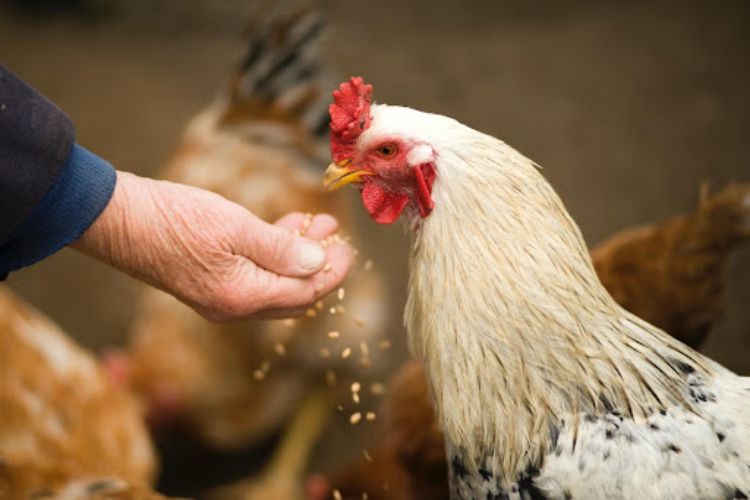 This article delves into the multifaceted realm of chicken feed, exploring various types available and elucidating the nutritional requirements necessary for optimal chicken health.
This article delves into the multifaceted realm of chicken feed, exploring various types available and elucidating the nutritional requirements necessary for optimal chicken health.
By adopting a research-based approach, this article aims to provide objective information to assist readers in selecting the most suitable feed for their chickens.
Additionally, it examines organic and non-GMO options as alternatives to conventional feeds.
Moreover, practical recommendations regarding proper feeding and storage techniques are provided to ensure an informed and efficient approach to poultry nutrition management.
Table of Contents
Different Types of Chicken Feed
Different types of chicken feed include pellets, crumbles, and mash, each offering specific benefits and considerations for poultry nutrition.
Optimal protein levels for chicken feed play a crucial role in supporting the growth and development of chickens. Commercial chicken feed formulations commonly consist of various ingredients that provide essential nutrients required by the birds. These commonly include grains such as corn, wheat, and barley, which serve as energy sources. Additionally, soybean meal or other plant-based proteins are included to meet the protein requirements of chickens.
Minerals such as calcium and phosphorus are also added to promote bone health and eggshell production. Vitamins like vitamins A, D3, E, and B12 are incorporated to support overall health and immune function. Furthermore, additives like probiotics may be included to enhance gut health and digestion in chickens.
Keywords: optimal protein levels for chicken feed, common ingredients in commercial chicken feed formulations
Understanding Nutritional Requirements for Chickens
Varying types of feed must be formulated to meet the specific nutritional requirements of chickens. Common nutritional deficiencies in chickens include inadequate protein, energy, vitamins, and minerals. A balanced diet is crucial for optimal chicken health and productivity.
Protein is essential for growth, feather development, egg production, and muscle maintenance. Energy sources such as carbohydrates and fats provide fuel for metabolic processes. Balancing protein and energy levels is important because an excess or deficiency can lead to various health issues.
Proper vitamin supplementation ensures normal physiological functions and immune response. Essential minerals like calcium, phosphorus, and magnesium are necessary for bone development and eggshell quality. Understanding these requirements allows farmers to create suitable diets that promote healthy growth, reproductive performance, disease resistance, and overall well-being in chickens.
Choosing the Best Feed for Your Chickens
Various factors need to be considered when selecting the most appropriate feed for chickens. One important factor is evaluating the cost-effectiveness of different chicken feed options. It is crucial for poultry farmers to choose a feed that provides optimal nutrition while being economically viable. This can be achieved by comparing the nutrient content and price of various feeds available in the market.
Additionally, it is essential to consider the specific nutritional requirements of the chickens at different stages of their life cycle.
Furthermore, there are common mistakes that should be avoided when feeding chickens. Overfeeding can lead to obesity and related health issues, while underfeeding can result in malnutrition and reduced egg production. It is important to provide a balanced diet that includes essential nutrients such as proteins, vitamins, and minerals.
Moreover, using expired or moldy feed should be strictly avoided as it can cause digestive disorders and impact overall bird health.
Organic and Non-GMO Chicken Feed Options
One important aspect to consider when selecting chicken feed is the availability of organic and non-GMO options in the market.
Organic chicken feed is produced without the use of synthetic pesticides, fertilizers, or genetically modified organisms (GMOs), while non-GMO feed does not contain any genetically modified ingredients.
These options offer several benefits for both chickens and consumers. Natural chicken feed ingredients, such as organic grains and seeds, provide essential nutrients that promote overall health and well-being in chickens.
Additionally, research has shown that feeding chickens with organic and non-GMO feed can have a positive impact on egg quality. Eggs from hens fed with natural feed tend to have higher levels of omega-3 fatty acids, vitamins, and minerals compared to eggs from conventionally fed hens.
Therefore, choosing organic or non-GMO chicken feed can be a valuable investment for those seeking healthier poultry products.
Tips for Proper Feeding and Storage of Chicken Feed
Proper feeding and storage techniques are essential for maintaining the quality and nutritional value of chicken feed. Following specific guidelines for chicken feed storage can help prevent common feed-related problems.
Firstly, it is crucial to store chicken feed in a cool, dry, and well-ventilated area to avoid moisture absorption, mold growth, and nutrient degradation. The use of sealed containers or bins can also protect the feed from pests such as rodents and insects.
Additionally, regular inspection of stored feed for signs of spoilage or contamination is necessary to ensure its freshness and safety.
Moreover, adhering to recommended feeding practices like providing adequate amounts of fresh feed daily, avoiding overstocking of birds near feeding areas, and preventing direct contact between chickens and the ground during feeding can further minimize potential issues associated with chicken feed consumption.






